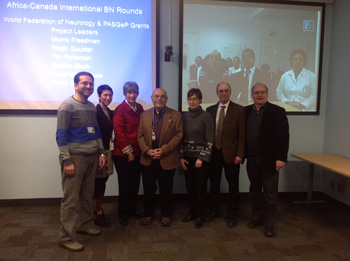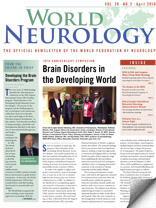Morris Freedman, MD, FRCPC, Tim Patterson, BA, Riadh Gouider, MD, Sandra E. Black MD, FRCPC, FAAN, FAHA, Cindy J. Grief, MD, FRCPC, MSc, and Peter Whitehouse

In front of screen in Canada (left to right) Ayman Selim, Carmela Tartaglia, Sandra Black, Arnold Noyek, Cindy Grief, Morris Freedman, Tim Patterson. On the screen from Tunisia (foreground, left to right) Riadh Gouider, Mouna Ben Djebara and (background) Tunisian participants.
In 2012, the World Federation of Neurology (WFN) eLearning Task Force of the WFN Education Committee proposed an expansion of the ground-breaking Canada-Tunisia videoconference as reported in the World Neurology Newsletter (Vol.27 – No.1-February 2012). This interactive and live videoconference was held in late May 2011, two weeks into the Arab Spring Uprising. It demonstrated both the WFN vision to connect international centers throughout the world and the determination of Tunisia to participate in a global educational videoconference at a time of great disruption to its society.
Building on the success of the Canada-Tunisia international rounds, the WFN awarded an educational grant to expand this initiative into an Africa-Canada series involving Tunisia, Morocco and Canada. The grant was in conjunction with the Peter A. Silverman Global eHealth Program, and the international rounds are under the auspices of the Canada International Scientific Exchange Program (CISEPO), Canadian Neurological Sciences Federation, Division of Neurology, University of Toronto and Razi Hospital La Manouba, Tunis.
Carmela Tartaglia and hosts Morris Freedman, Sandra Black and Riadh Gouider initiated the series Jan. 15, 2014, with a presentation titled, “An Uncommon Cause of a Common Problem.”Audience participants included sites from Canada and Tunisia. This event, and the videoconference series as a whole, serve as a prime example of the WFN’s goal to foster quality neurology and brain health worldwide. This educational format promises to be of great benefit, especially to those countries where educational resources in neurology are limited despite the quest for knowledge.
The series also demonstrates the universality of health care as a common language bridging societies together.
“These rounds have the potential to bring together health care professionals from across the world in a forum that transcends cultural and political differences that may otherwise pose barriers to dialogue,” said Freedman. In addition, “the rounds provide an opportunity to share the differences and challenges across national boundaries,” said Whitehouse.
Providing a Tunisian point of view, Gouider said, “The importance of the International Behavioral Neurology Rounds are in the content and also in the collaborative teaching methodology. It demonstrates that language and time differences between continents may be easily bypassed.”
The connectivity is accomplished through the Internet and bridging, with each of the receiving sites having the appropriate videoconferencing equipment. The videoconferences are monitored and evaluated under the successful University of Toronto Behavioral Neurology Rounds that have been videoconferenced to provincial and international sites over the last 10 years.
The launch of Africa-Canada international behavioral neurology rounds will act as a beacon for the success of future programming and hopefully as a stimulus for additional international projects involving disciplines in other areas of neurology using the medium of videoconferencing.
